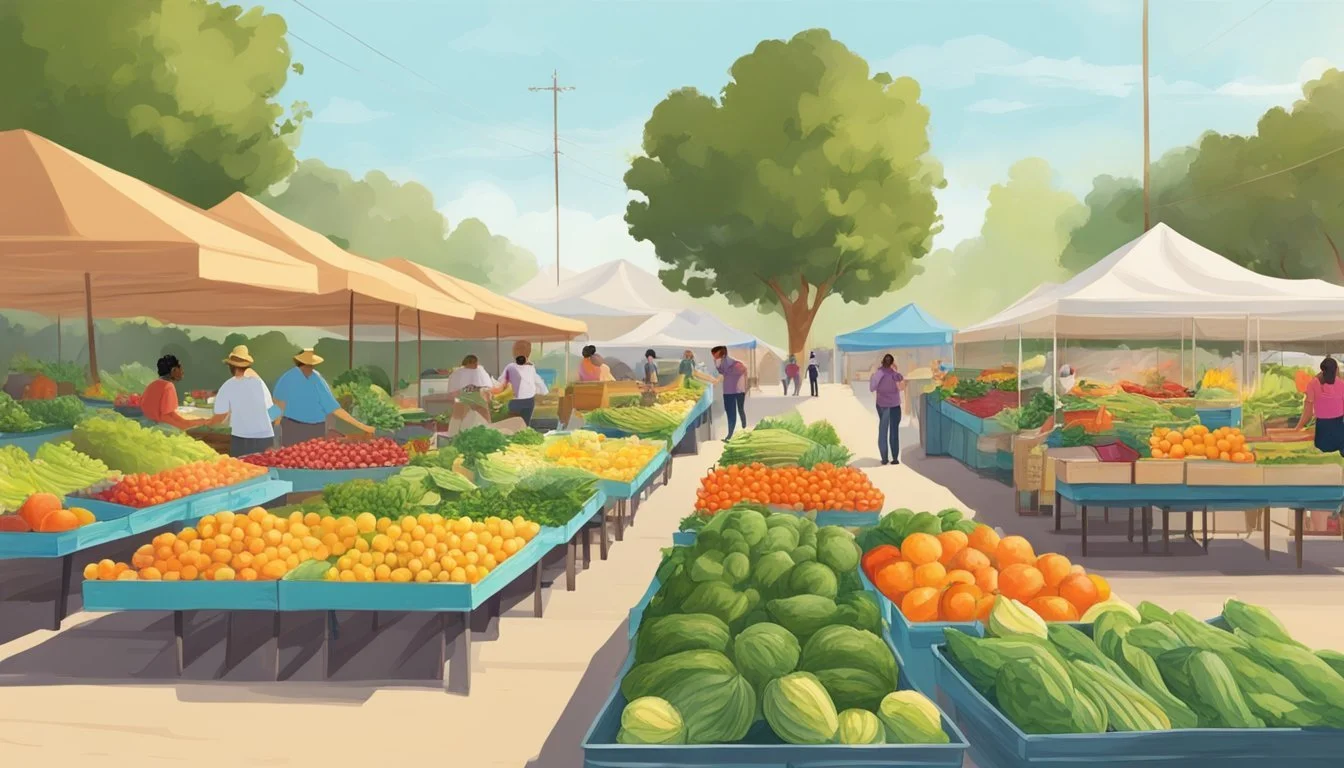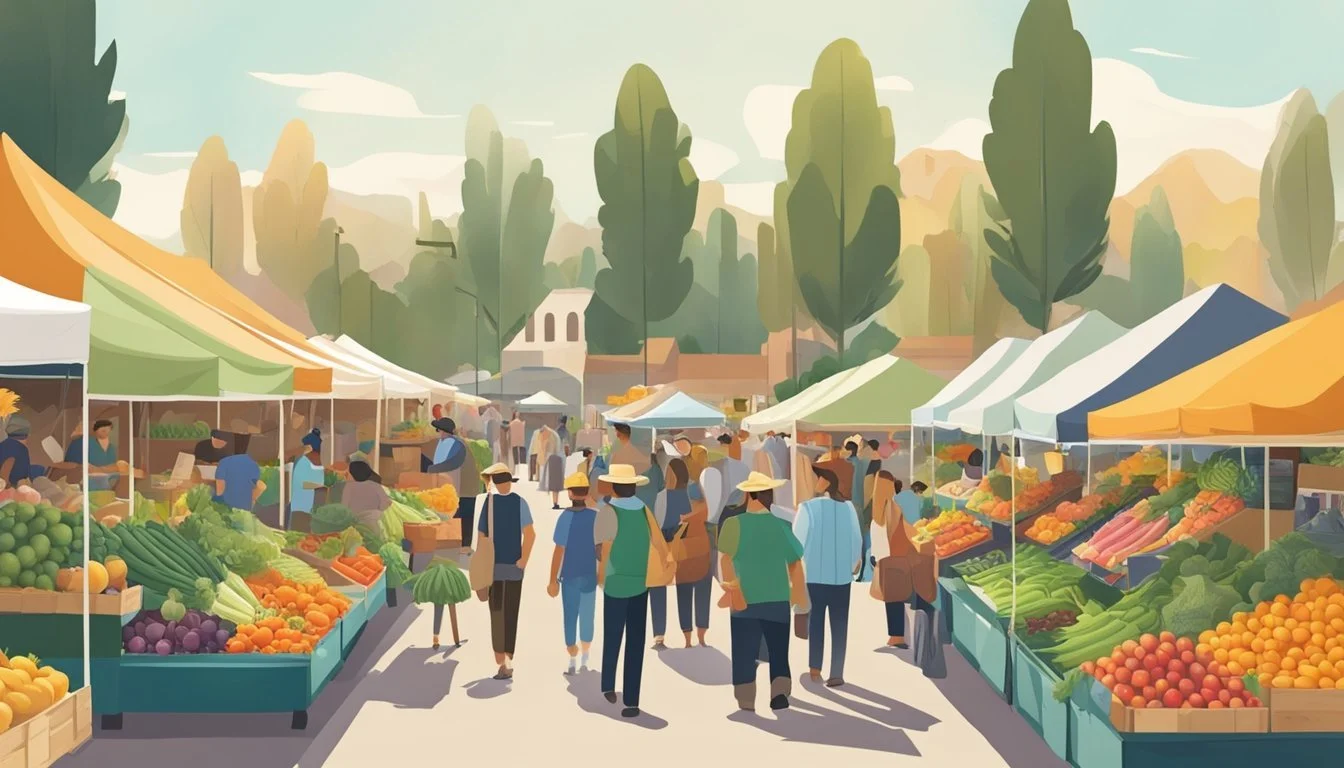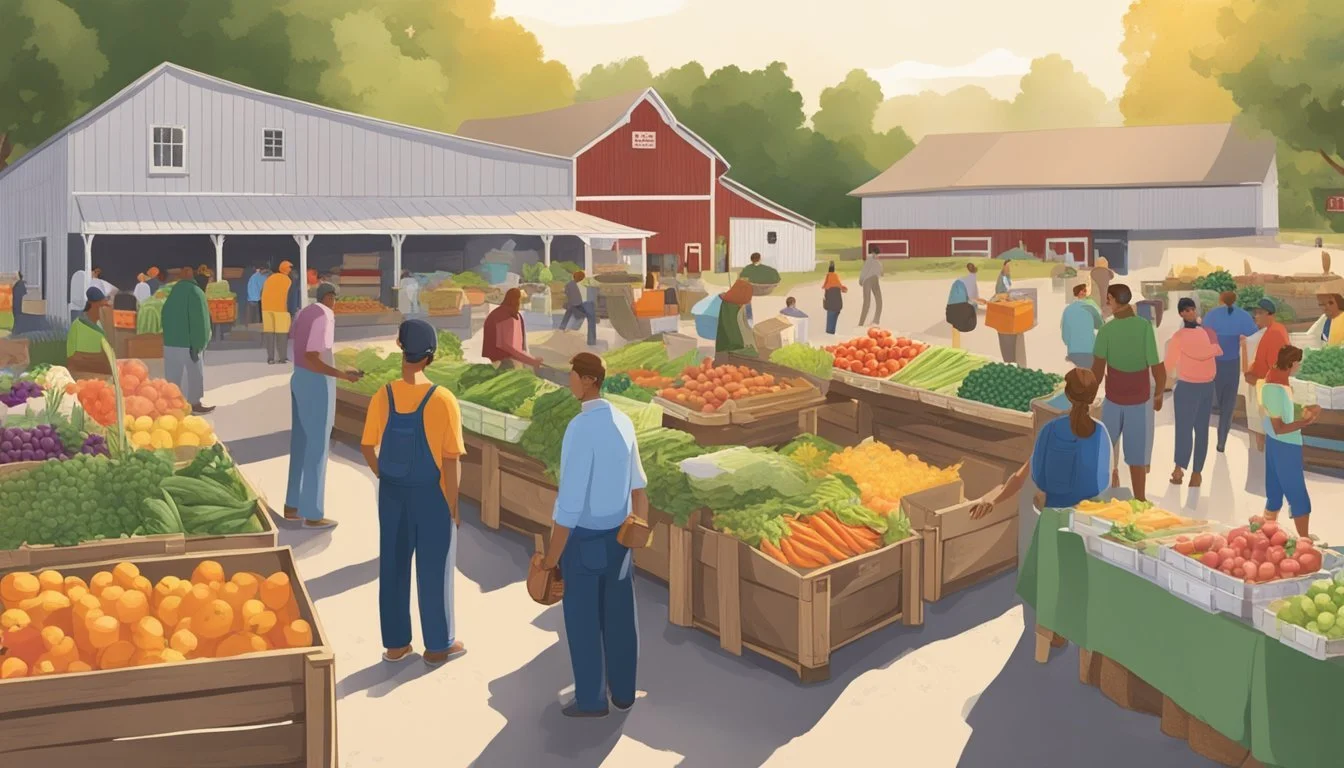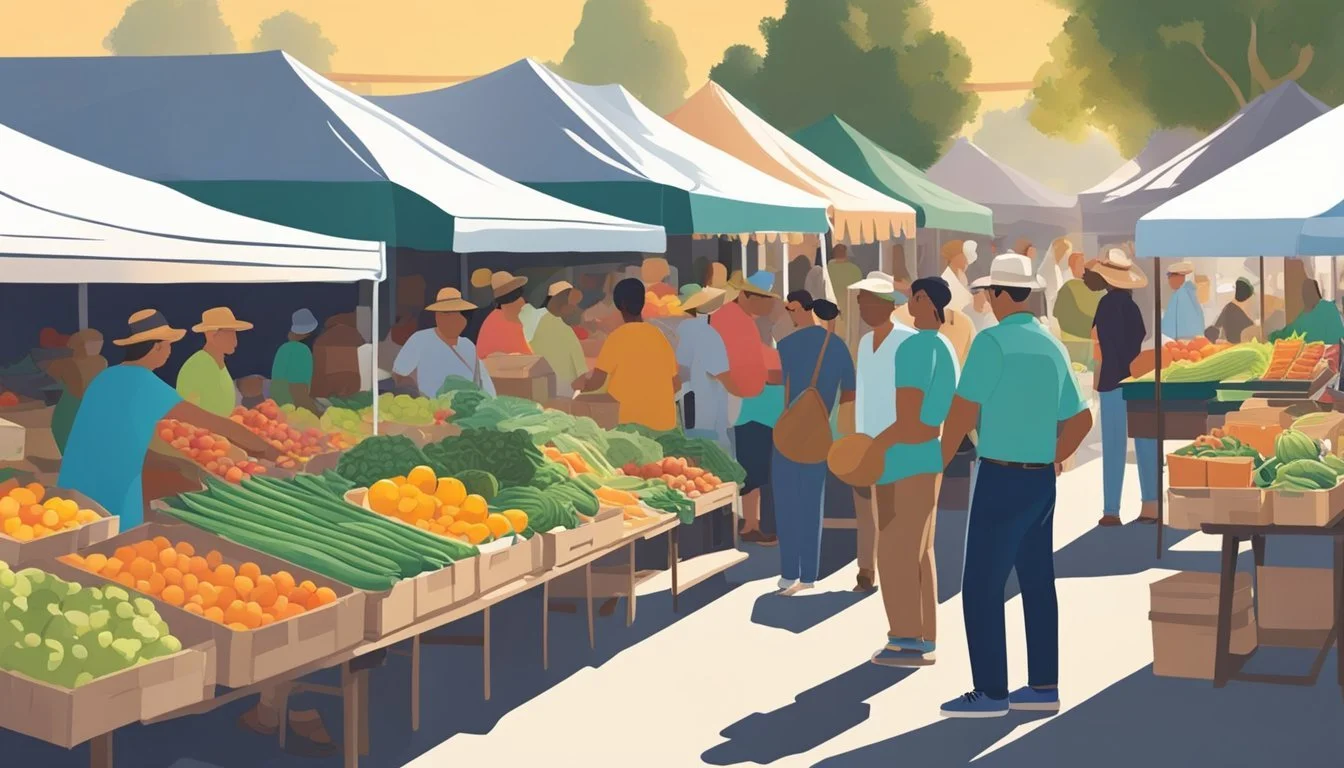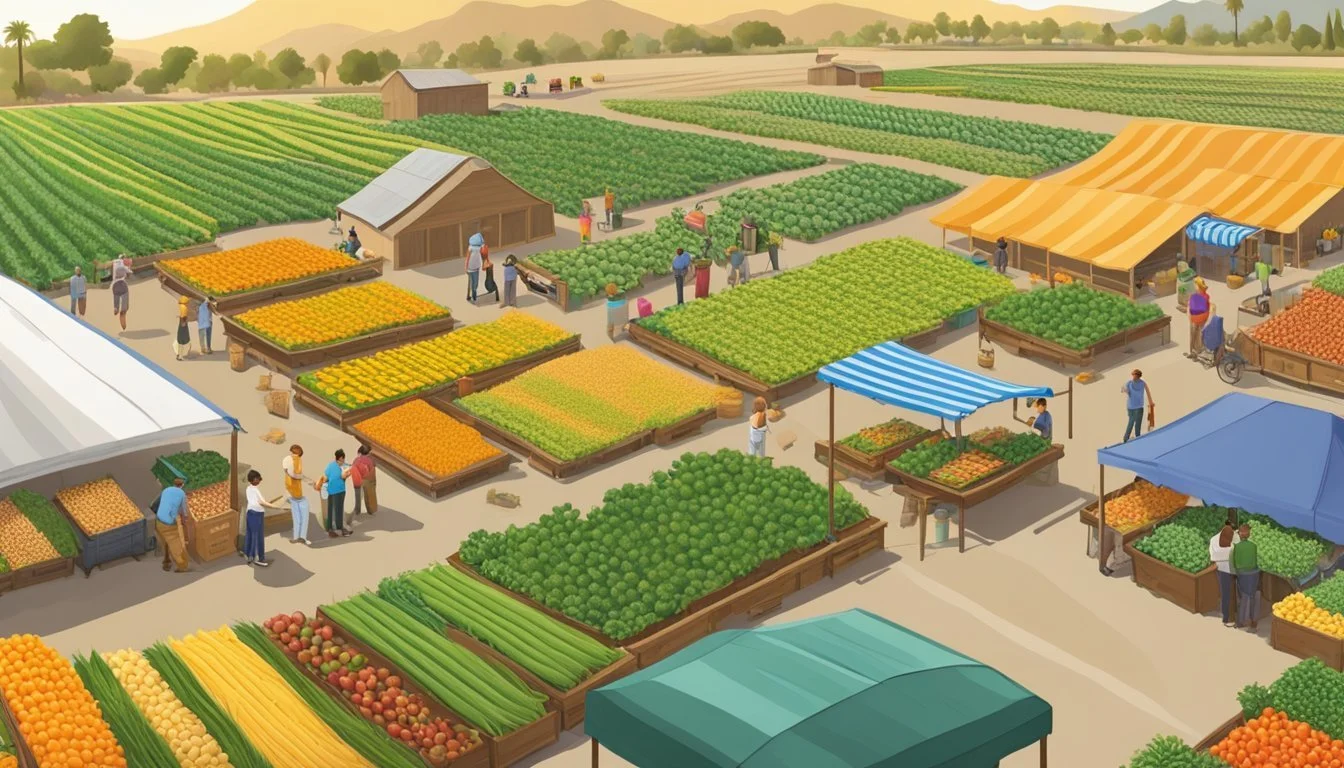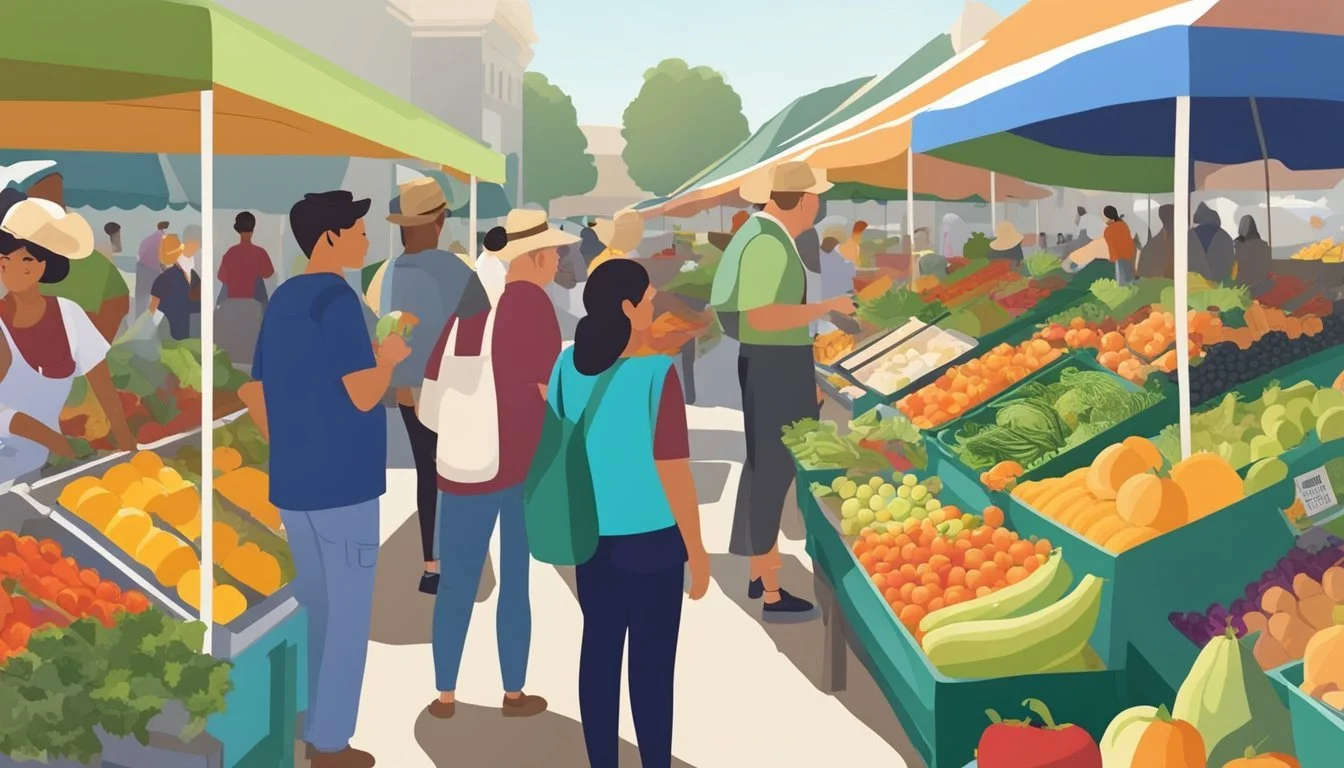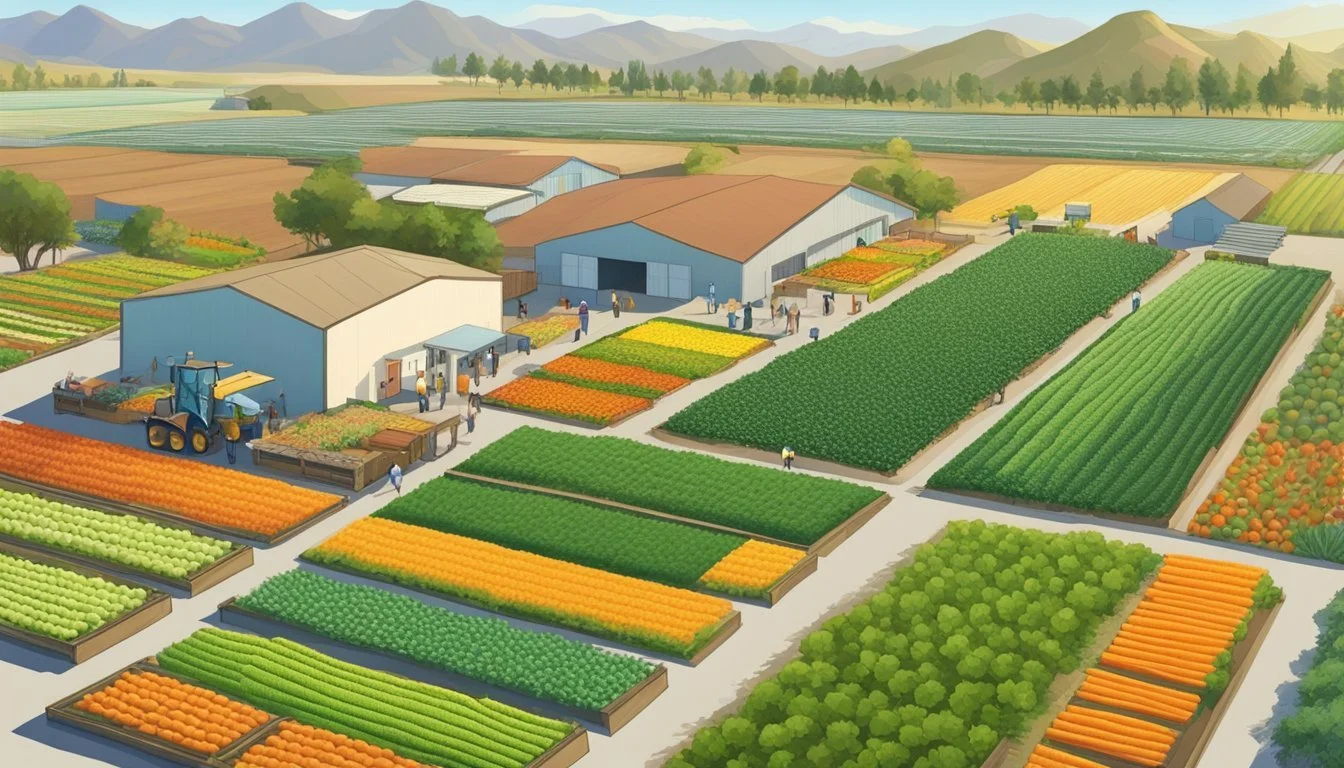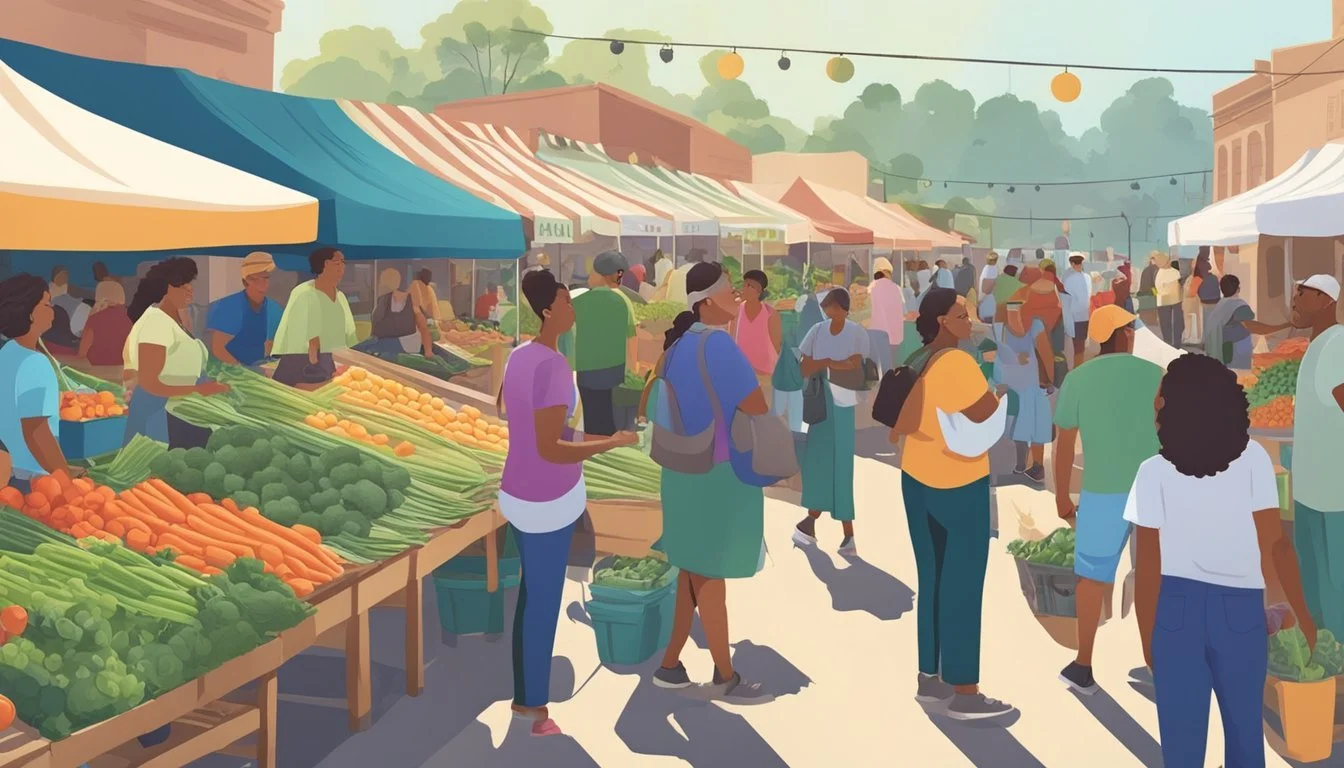Community Supported Agriculture (CSA) in Rialto, CA
A Guide to Local Farm Partnerships
Community Supported Agriculture, commonly known as CSA, is a model of agriculture and food distribution that directly connects farmers and consumers. In Rialto, California, residents have the opportunity to participate in this system, which entails purchasing shares from local CSA farms. By doing so, they support the agriculture economy in their community, while simultaneously securing a regular provision of fresh, homegrown produce for themselves and their families.
CSA models in Rialto provide a valuable interface between sustainable agricultural practices and community members seeking to indulge in the benefits of organically grown fruits and vegetables. Through these programs, subscribers receive a weekly or bi-weekly box of seasonal produce, fostering a deeper understanding of seasonal eating and promoting the financial stability of local growers. These farms, sometimes employing innovative practices such as utilizing straw-bale constructions for enhanced sustainability, underscore the environmental and social benefits of locally sourced food.
This direct farm-to-table approach not only aids in maintaining the viability of local farms but also educates people on the importance of sustainable agriculture. Members of Rialto's CSAs are investing in their health and the health of their local community by contributing to a system that values environmental stewardship and the viablity of small-scale farms. The growth of CSAs in the area reflects an increasing awareness and commitment to these shared values.
Understanding CSA
Community Supported Agriculture (CSA) represents a partnership between local farmers and community members who benefit from fresh, seasonal produce while supporting local agriculture and nutrition.
CSA Concepts and History
The idea behind CSA is to connect local farmers directly with consumers through a membership model. A CSA operates on the foundation of a "share" system, where individuals purchase a "share" of the farm's harvest. In turn, these members, also known as "shareholders," receive a portion of seasonal produce throughout the farming season. Originating in the 1960s in Switzerland and Japan due to concerns about food safety and farm preservation, the concept arrived in the United States in the 1980s and has grown in popularity ever since. California, having a climate favorable to diverse agricultural practices, has embraced the CSA model to ensure residents have access to fresh, nutritional produce from their local environment.
The Importance of CSA
CSA memberships have a meaningful impact on community health and nutrition by providing consistent access to fresh, local food. They also foster a sense of community as members often engage with the farmers and sometimes participate in farm-related events. This model of agriculture benefits the environment by promoting sustainable farming practices and reducing the carbon footprint associated with long-distance food transport. It encourages a resilient and eco-conscious community, where the shared rewards and risks of food production strengthen the bond between growers and consumers.
CSA in Rialto, CA
In Rialto, California, Community Supported Agriculture (CSA) connects the community with local farms, ensuring access to fresh, organically-grown produce while supporting the local economy and fostering a sense of shared responsibility.
Prominent CSA Farms in Rialto Region
Three Sisters Farm, situated in San Timoteo Canyon, Redlands, has been an important CSA provider since becoming certified organic in 2008. They grow their produce on a 2-acre parcel and distribute it through their CSA and a local farmers market. Another notable presence in the vicinity of Rialto is the Huerta del Valle Community Garden in Ontario, which offers organically grown produce and operates a micro-CSA for the local community.
In Colton, nearby Rialto, Rancho de los Proyectos has garnered attention for its commitment to community and local farming, although it's less conventional than a standard CSA. Further strengthening the local food system, Brian G. Griffith in Riverside adds to the list of farmers who believe in a direct and responsible relationship with consumers.
Local Impact of CSA
CSAs in the Rialto region have a multifaceted influence on the community. They not only provide residents with regular access to fresh, seasonal produce but also play a pivotal role in boosting the local economy. By directly purchasing shares from local farms, members of the community invest in the sustainability of agriculture in their area. A detailed listing of such CSAs can be found in Local Food Directories, which promote the CSA model and advocate for the continuation of these essential community-agriculture bonds.
CSA Membership and Subscription
Community Supported Agriculture in Rialto, CA offers individuals a unique opportunity to become integral members of the local food system through subscription models that are both engaging and beneficial to the community.
How CSA Membership Works
Membership in a CSA involves a consumer subscribing to receive a regular allotment of produce from a local farm. In Rialto, interested customers can pay an upfront fee to become members of a CSA program. This investment typically covers one season of harvest and entitles members to a portion of each harvest, referred to as a "share." CSA shares often include a variety of vegetables and may also feature other farm products such as fruits, herbs, and sometimes eggs or dairy.
Seasonal Subscription Models
Rialto's CSA subscription models traditionally follow the seasonal cycles of farming. This system allows members to receive fresh, seasonal produce according to the natural growing season in the region. Subscriptions usually come in the following formats:
Full Share: Weekly delivery of produce throughout the season. Payments are made either upfront or through regular installments.
Half Share: Bi-weekly delivery of produce, ideal for smaller households or those with less demand for fresh produce. This model also involves upfront or periodic payments.
Farmers and customers engage in a seasonal partnership where members typically choose their pick-up location from a list the farm provides, fostering a sense of community through regular interactions between consumers and local growers. The membership sales help farmers with cash flow and planning, directly linking their economic sustenance to their customer base.
Production and Distribution
Community Supported Agriculture in Rialto, CA is characterized by direct, fresh-from-the-farm distribution and a reliable rhythm tuned with nature’s calendar. Producers prioritize environmentally sound practices, and consumers enjoy seasonal produce reflecting the region's diversity.
Harvesting and Seasonality
In Rialto, farmers calibrate their harvesting techniques to the ebbs and flows of the seasons, ensuring a bountiful yield of vegetables and fruits. Harvest periods are carefully planned, as Rialto's climate permits a wide range of seasonal produce. Vegetables such as tomatoes, peppers, and leafy greens are picked at their peak, alongside prime selections of citrus and stone fruits. Farmers employ sustainable methods, minimizing the use of pesticides to maintain the integrity of the crops.
Distribution and Sales Channels
Sales channels for CSA produce in Rialto are streamlined for efficiency and consumer proximity. Shares of the harvest are typically distributed weekly at local farmers markets or through direct farm pick-ups. CSA members might also find their produce at select local retail outlets. Through these channels, customers engage directly with farmers, cultivating relationships that extend beyond mere transactions. This sales model reinforces community bonds and supports the local economy, embodying the true spirit of CSA networks.
CSA Benefits and Challenges
Community Supported Agriculture (CSA) in Rialto, CA, presents a mixed bag of opportunities and considerations that community members should weigh. This section breaks down the advantages and the potential risks involved.
Advantages of Joining a CSA
Health and Nutrition: Joining a CSA provides members with access to fresh, seasonal produce, directly from the farm. This supply chain shortening ensures that the food is not only fresh but often more nutrient-dense than store-bought alternatives. It also creates a platform for educating members about healthy eating and nutrition.
Community: CSAs in Rialto foster a sense of community. Shareholders often have direct contact with farmers and fellow CSA members, strengthening local ties.
Local Food Economy: Members support the local economy by investing their food dollars directly into nearby farms, which helps to maintain agricultural land and contributes to regional food security.
Environmental Benefits: By purchasing local foods, members of a Rialto CSA reduce their carbon footprint as the items have traveled a much shorter distance from farm to table. Additionally, CSAs often practice sustainable farming techniques that are kinder to the earth.
Risks and Considerations
Risks: While CSAs offer fresh produce, they also come with risks. Shareholders share in the production risks of the farm; if there is a bad harvest, members receive less produce. This requires them to be flexible with their weekly meal planning.
Share Commitment: Purchasing a CSA share means a commitment to the season, which can be challenging for some if their circumstances change or if they move away.
Variety and Choice: Unlike shopping in a supermarket, CSA members in Rialto do not have the same level of choice over what produce they receive. It is bound to what is seasonal and what the farm is able to harvest.
Community Impact: While supporting the local community is a benefit, there is also the consideration of whether the community can sustain multiple CSAs. A balance is essential to prevent market saturation and maintain the benefits for local farmers.
Agricultural Practices
In Rialto, CA, Community Supported Agriculture (CSA) focuses on incorporating advanced agricultural practices that ensure sustainability and the health of the environment. These methods include organic farming techniques and strategic crop diversification which align with broader goals for both ecological integrity and community wellness.
Organic and Sustainable Farming
Many CSA farms in Rialto adhere to organic farming principles, avoiding synthetic pesticides and fertilizers. Three Sisters Farm, a notable CSA in the region, is among those that operate with certified organic status, which ensures that all their crops and vegetables are organically grown without the use of harmful chemicals. Farmers in the CSA employ sustainable use of resources, which not only enhances the soil quality but also supports the surrounding environment. Some key sustainable practices include:
Crop rotation: To maintain soil health and nutrient balance.
Composting: Turning organic waste into valuable fertilizer.
Biological pest control: Using natural predators to manage pests, reducing the need for chemical interventions.
Crop Diversity and Planting Strategies
CSAs in Rialto utilize a rich variety of crops, contributing to crop diversity crucial for ecological balance. Seasonal produce is a cornerstone of CSA offerings, ensuring members receive the freshest variety as per the harvesting schedule. Farmers strategically plan planting to maximize yield and quality. Some innovative planting strategies include:
Succession planting: Planting new crops in intervals to ensure a steady harvest throughout the season.
Companion planting: Growing complementary plants together, like the "Three Sisters" method where corn, beans, and squash are planted in proximity for mutual benefit.
Planting Strategy Description Succession Planting Ensures continuous production and supply. Companion Planting Benefits plants' growth and repels pests naturally.
By focusing on these practices, CSA farms in Rialto are able to deliver fresh, high-quality produce, while maintaining a deep commitment to environmental stewardship and sustainability.
Community Engagement and Events
Community Supported Agriculture (CSA) in Rialto, CA focuses on fostering a strong community bond through various events and workshops. These initiatives emphasize on education and direct engagement, offering CSA members a chance to immerse themselves in local food systems.
CSA Events and Workshops
CSA in Rialto regularly hosts a range of events and workshops aimed at educating members and the public on sustainable agriculture practices. From "Seed Planting Days" to "Cooking with Local Produce" classes, these events are designed to deepen community knowledge and involvement. Such workshops not only provide hands-on learning but also strengthen the relationship between farmers and the community.
Seed Planting Days
Educational: Learn how to start a garden with heirloom seeds
Community Building: Connect with fellow CSA members and farmers
Cooking Classes
Seasonal Cooking: Discover recipes utilizing the current harvest
Preservation Workshops: Learn canning and preserving techniques for year-round enjoyment
Engaging with Local CSA Communities
CSA programs in Rialto place a high priority on engaging community members. They encourage active participation in CSA membership, which includes regular meet-ups to discuss the growth and challenges of the local food system. Membership also offers the chance to attend potlucks and farm-to-table events where individuals can connect with farmers and fellow CSA members.
Monthly Meet-Ups
Discussion: Topics range from ecological practices to community wellness.
Networking: Opportunities for members to build relationships and share resources.
Farm-to-Table Events
Gatherings: Celebrate the harvest with meals prepared from locally sourced ingredients.
Support: These events serve to generate support for local agriculture and foster a sense of unity.
Nutrition and Food Education
Community Supported Agriculture (CSA) in Rialto, California is not just about providing fresh produce to the community; it also encompasses comprehensive nutrition and food education aimed at enhancing health and cooking skills.
Educational Outreach in CSAs
CSA programs in Rialto actively engage in educational outreach. They aim to increase self-efficacy and improve eating behaviors among low-income caregivers through a combination of cost-offset CSA participation and nutrition education. Caregivers receive hands-on learning opportunities which empower them to make healthier food choices for their families.
Cooking with CSA Produce
Cooking workshops and educational materials are often provided to CSA members in Rialto. These resources are meticulously designed to help incorporate the fresh vegetables and fruit from the CSA shares into daily meals. Educational interventions have been shown to boost skills in using fresh produce, which is vital in enhancing the dietary quality and health of the community.
Economic and Market Analysis
In Rialto, CA, Community Supported Agriculture (CSA) has multifaceted economic implications, affecting everything from local sales trends to the fiscal strategies adopted by CSA managers.
Market Trends in CSA
The CSA model in Rialto reflects a growing consumer inclination towards supporting the local economy. Data indicates a sustained increase in membership as community members commit to CSA programs, thereby fueling the local economy. Sales figures from area farmers' markets, often aligned with CSAs, show that there is a steady consumer demand for locally produced food. CSA memberships contribute directly to these trends, offering a subscription-like payment structure that stabilizes income for farmers and provides customers with fresh produce.
Membership Growth: Year-on-year membership has seen a progressive rise.
Sales Data: Farmers' market sales correlate with CSA membership trends, suggesting a solid local customer base.
Fiscal Responsibility and CSA Management
CSA management in Rialto takes on the responsibility of ensuring economic sustainability. CSA managers, utilizing various APIs for data analytics, track sales and consumer patterns to adapt their offerings effectively. Efficient management of finances, including the stewardship of membership fees and the allocation of funds, directly impacts the viability of individual CSAs. This reflects a broader commitment to community support and responsibility.
Budget Allocation:
Operating Costs: Ensuring that the majority of revenue goes into high-quality produce.
Investment in Community: A portion of revenue is reinvested into local community initiatives.
API Utilization: Market managers implement APIs to analyze sales data, driving informed decisions on crop selection, pricing, and market strategies.
Case Studies
The exploration of Community Supported Agriculture (CSA) in Rialto, California, presents a compelling tableau of how local initiatives can shape food systems. This section examines real-world instances and draws insights from both triumphs and trials in Rialto's CSA landscape.
Success Stories of Community Supported Agriculture
Rialto Urban Farm: A key success story revolves around Rialto Urban Farm, a local CSA that has seen an uptick in membership over recent years. Their strategy includes integrating health education with their fresh produce distribution, strengthening the health-conscious community around them. With an array of organic vegetables and fruits on offer, they have become a staple at the local farmers market, receiving acclaim for bolstering local food security.
Membership Growth:
2022: 150 members
2023: 250 members
2024 projection: 300+ members
Education and Community Outreach: Educational workshops provided by CSAs on sustainable practices and the health benefits of fresh produce have increased community engagement. Schools in Rialto participate in farm visits, embedding the importance of CSAs in the youth mindset, fostering a new generation of informed consumers.
Challenges and Lessons Learned
Drought and Resource Management: Farmers partaking in CSAs in Rialto have faced significant challenges stemming from water scarcity. Innovative irrigation techniques and drought-resistant crops have emerged as a response, teaching a valuable lesson on resource adaptability and the importance of sustainable farming practices.
Lessons in Sustainability:
Adoption of drip irrigation systems
Incorporation of native, drought-resistant crops
Market Fluctuations and Economic Risks: Economic hardship has taught CSAs the importance of financial planning. Instances of fluctuating market prices for produce taught them the risks associated with agriculture-based enterprises. Sharing these lessons among the community has led to more robust financial strategies that ensure the stability of local CSAs, despite external economic pressures.
Financial Adaptations:
Creation of emergency funds
Diversification of produce to manage risks
This section accords readers case studies that chart the course of CSAs in Rialto, offering a detailed view of the dynamic interplay between community support, health consciousness, and lessons in the form of responses to climatic and economic challenges.
CSA and Technology
Community Supported Agriculture (CSA) in Rialto has harnessed modern technology to improve operations and customer engagement. Software solutions and data analytics play a crucial role in optimizing CSA performance.
Innovative CSA Management Software
The advent of CSA management software has revolutionized how CSAs in Rialto operate. These integrated systems streamline subscriptions, member management, and payment processes. A critical feature of this software is its API (Application Programming Interface), which facilitates communication between the CSA platforms and other digital systems like CFMS (Community Food Marketplace Software). This integration allows for seamless data transfer and aids in managing large quantities of member information and transaction data efficiently.
Data Analytics for CSA Optimization
CSA innovation network embraces data analytics to sharpen its business operations and tailor offerings to member preferences. By analyzing data on consumption trends and member feedback, CSAs can enhance crop planning and distribution logistics. The collected data is also instrumental in understanding the demographics and buying patterns of CSA subscribers, which informs marketing strategies and subscription options. Data analytics enables CSAs to forecast demand more accurately, which is pivotal in reducing food waste and ensuring the sustainable success of such networks.
Additional CSA Resources
Exploring Community Supported Agriculture (CSA) in Rialto, CA connects residents with a variety of resources that help consumers find local foods and ensure the authenticity and sustainability of the products they're purchasing.
Local Food Directories and Networks
Residents looking for Community Supported Agriculture can begin with local food directories and networks. These platforms provide comprehensive listings of CSA farms and local food producers in Rialto and the surrounding areas. A prominent resource to consider is the CSA Innovation Network, a hub that fosters the sharing of ideas and innovations among CSA farmers and associations. Additionally, Certified Farmers' Markets (CFMs) offer directories which list markets where consumers can find local and sustainably produced foods.
Certification and Regulation Authorities
Purchasers concerned with organic and sustainable farming practices should be aware of the certification and regulation authorities that validate CSA farm operations. Farms claiming to be "Certified Organic" must adhere to national standards set by the USDA's National Organic Program. Verification ensures no synthetic fertilizers, pesticides, or GMOs are used, which is crucial for consumers prioritizing health and environmental sustainability. In addition to federal certification, local authorities may have supplementary guidelines, further encouraging practices that protect ecosystems and community health.
Supporting Local Farms and Businesses
Community Supported Agriculture in Rialto, California, provides a symbiotic relationship between farmers and consumers, fortifying the local economy while ensuring access to fresh produce. CSAs facilitate ease and convenience for members who support agricultural sustainability and community wellness.
The Role of CSAs in the Local Economy
Community Supported Agriculture (CSA) models significantly bolster the local economy by enabling consumers to invest directly in farm shares. This upfront investment allows farms to plan efficiently, reducing wasted resources and ensuring a stable market for their produce. Local farmers, such as those in the surrounding areas of Loma Linda and Chino, CA, gain financial security from these partnerships, which directly translates into the local economic stability. Additionally, Clarks Nutrition and Natural Foods Market, with locations within driving distance of Rialto, may source fresh, local produce from CSAs, thereby keeping financial resources circulating within the community.
Partnerships Between CSAs and Local Businesses
Partnerships between CSAs and local businesses, like specialty food markets, are central to building a robust local food system. These relationships provide local businesses an opportunity to offer a wide variety of fresh, organic goods, often leading to heightened consumer interest and repeat patronage. Rialto's community sees a direct impact when local establishments choose to partner with CSAs. The enhanced community collaboration further results in an economic multiplier effect, as money spent on local agriculture is more likely to be re-invested locally, strengthening the overall financial health of the region.



